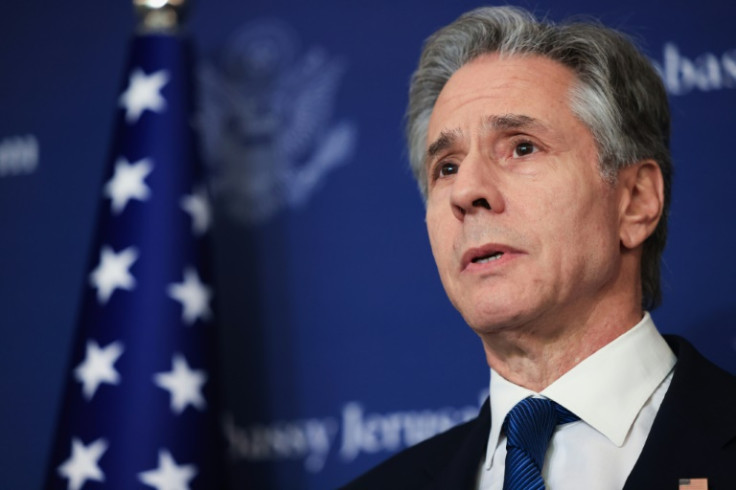
Top US diplomat Antony Blinken appealed Tuesday to Hamas urgently to accept a ceasefire plan to ease suffering in Gaza but also entered a public spat with Israel as he capped a new round of shuttle diplomacy.
The US secretary of state closed his ninth wartime trip to the region in which he warned that the US-backed truce proposal may be the "last chance" to broker an end the conflict.
"Time is of the essence," Blinken said after stops in key Arab mediators Qatar and Egypt as well as Israel.
"With every passing day, more bad things can happen to more good people who don't deserve it," he told reporters before flying out of the Qatari capital Doha.
"This needs to get done, and it needs to get done in the days ahead, and we will do everything possible to get it across the finish line," he said of the truce proposal.
The United States last week presented ideas to bridge gaps and, through Qatar and Egypt, has pressed heavily on Hamas to accept and return to talks this week in Cairo.
But a day after Blinken said that US ally Israel was on board, Prime Minister Benjamin Netanyahu was quoted by Israeli media as disagreeing on a key sticking point.
Netanyahu insisted that Israel maintain control of the Philadelphi Corridor, the border between Gaza and Egypt that Israeli troops seized from Hamas, who rely on secret tunnels to bring in weapons.
Blinken said that Israel had already agreed on the "schedule and location" of troop withdrawals from Gaza.
Since the start of the conflict, it was made "very clear that the United States does not accept any long-term occupation of Gaza by Israel", Blinken said when asked about Netanyahu's remarks.
A senior US official accompanying Blinken, speaking on condition of anonymity to discuss sensitive diplomacy, was more blunt, saying that such "maximalist statements" by Netanyahu "are not constructive" in reaching a truce.
Blinken acknowledged that differences remained and called for both Israel and Hamas to show "maximum flexibility" in their positions.
Egypt, the first Arab nation to make peace with Israel, has been infuriated by the border takeover.
Blinken has hoped to entice Netanyahu to compromise by offering the prospect of Israel achieving greater normalisation with the Arab world, including the ultimate prize of Saudi Arabia, guardian of Islam's two holiest sites.
Egyptian President Abdel Fattah al-Sisi, meeting Blinken at his Mediterranean summer palace in El Alamein, told him that "the time has come to end the ongoing war," according to an official Egyptian statement.
Blinken then travelled to Doha to meet with Emir Sheikh Tamim bin Hamad Al-Thani, but a US official said the Qatari ruler was feeling unwell and the two will instead talk on the phone soon.
Hamas on October 7 carried out the deadliest-ever attack on Israel, which has responded with a relentless offensive.
Hamas said it was "keen to reach a ceasefire" but protested "new conditions" from Israel in the latest US proposal.
Both Sisi and Blinken warned of the risks of greater regional escalation if ceasefire talks fail.
Lebanon's health ministry reported the deaths of five people in Israeli strikes -- one identified early Wednesday in the east, where Israel is attacking Hezbollah sites, and four in the volatile south.
Hezbollah, the Shiite Muslim movement backed by Iran, has claimed a series of attacks on Israeli troops.
Cross-border skirmishes have taken place almost daily between Israel and Lebanon but fears of a greater crisis soared when Hamas's political leader, Ismail Haniyeh, was killed on a visit to Tehran on July 31.
Iran has vowed retaliation, blaming Israel for the assassination, but so far it has held off, with the United States both sending additional forces and warning that regional war could destroy prospects for a Gaza ceasefire.
Netanyahu has faced public protests in Israel urging him to accept a ceasefire, which would bring back hostages who were seized on October 7 and whose plight has deeply moved Israelis.
The Israeli military said Tuesday that it had retrieved the bodies of six hostages from tunnels in southern Gaza, at least some of whom the military said were killed in Israeli military operations.
The October 7 attack resulted in the deaths of 1,199 people in Israel, most of them civilians, according to an AFP tally based on Israeli official figures.
Out of 251 people taken hostage that day, 105 are still being held hostage inside the Gaza Strip, including 34 the military says are dead.
Israel's retaliatory military campaign has killed 40,173 Palestinians in Gaza, according to the Hamas-run territory's health ministry, which does not give details of civilian and militant deaths.
The US plan would freeze fighting for an initial six weeks while Israeli hostages are exchanged for Palestinian prisoners in Israeli jails and humanitarian aid enters Gaza.
US President Joe Biden strongly supported Israel after October 7 but the war has become a political headache, with pro-Palestinian protesters marching on this week's Democratic convention in Chicago that is nominating Vice President Kamala Harris to run as his successor.
Biden told reporters in Chicago that he was informed that Hamas was "now backing off" from the ceasefire.
Hamas attacked Biden's "misleading claims" and said he was giving a "green light" to Israel to continue the war.




